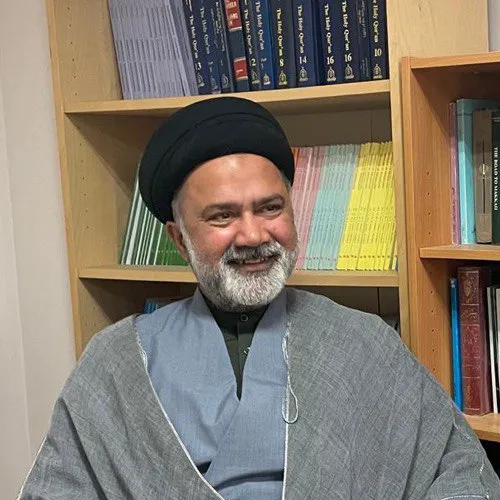HIWM Dr Syed Abbas Naqvi
Through the Friday Bulletin, we discovered an Imam Jumah who left the prestigious field of medicine to embrace religious studies and the role of a spiritual leader. HIWM Dr Syed Abbas Naqvi, the Imam Jumah of Woking, pursued spiritual knowledge in the seminary while simultaneously treating patients in hospitals, relying on his medical expertise to heal their physical ailments. Dialogue and association with other religions is one of this Imam Jumah’s characteristics. In an interview with the Friday Bulletin, Hujjatul Islam Dr Naqvi answered our questions concisely and to the point, for which we extend our sincere thanks.
Q1: May I request you to introduce yourself and your services in UK as Imam Jumah?
I was born in Pakistan in 1965, completed MBBS and basic religious studies in Pakistan. I studied and worked in Iran for 12 years. I came in United Kingdom in 2002 as Imam Jumah and resident Aalim in Leicester. I moved to Woking, Surrey in 2005 as Resident Aalim and Imam Jumah and carrying on my religious duties up to date.
Woking is a historical town. First mosque of UK and Northern Europe was built here in 1889 as Shah Jahan Mosque. We have Muslim Burial Ground of First World War. Great translator of Quran in English, Marmaduke Pickthall and Abdullah Yousuf Ali are buried in Woking.
Q2. You were a professional Medical Doctor. Why did you prefer to serve as a religious scholar?
Alhamdullilah, I was brought up in religious environment from my childhood. I started my religious education with school education side by side. I was delivering Islamic lectures to young students at colleges and universities in Pakistan while I was a medical student through Imamia Student organisation. I carried on my Houza studies in Tehran and working in Hospital over there.
I came in England in 2002 to deliver Muharram lectures in Leicester and they requested to join them as Resident Aalim and Imam Jumah. I decided to give all my times and skills to followers of Ahlulbait (pbut) living in west and their young generations. All of my Friday sermons were delivered in English. I compiled 8 books for children to be taught in madrassahs and published by Majlis e Ulama e Shia Europe.
Q3. Why an Imam Jumah should be humble and having ordinary simple life?
An Imam Jumah should lead a simple life to embody the values of humility, sincerity, and moderation that Islam teaches. Simplicity in lifestyle allows the Imam to focus on their spiritual responsibilities, serve the community effectively, and be a true representative of the message of Islam. By living modestly, the Imam provides a model of piety, devotion, and balance, helping to foster a community that prioritizes faith over materialism.
Q4. Would you like to tell us more about your Interfaith work in UK?
I am strong believer of peace, love, respect, sharing and understanding among believers of all religions. I was quite active as Interfaith leader representing beauty of Islam to others via talks, meetings, common gatherings, sitting and eating together. I am one of the founder and Trustee of Woking People of Faith where followers of all faiths work together since 2006. I am Chair and Trustee of Surrey Muslim Association and Shia- Sunni Muslims work together for academic and social growth of our community. I am also Trustee/ Finance Secretary of Majlis e Ulama e Shia Europe.
Q5: Please let us know about your activities with youth.
I love to sit, to work, to teach, to play and to build the future of our young generation. From my school, College and University life, I preferred to lead, and to guide my classmates and other youth to be successful student and a true believer. I continued that work in UK. Under umbrella of MUS, we organise annual camps for youth, having scout camps, and many local and overseas trips with youth.
Q6- The Friday Imam must be aware of Imam Haq (ats) and aim for his (ats) satisfaction and take into account the interests of the people and their satisfaction. What does this mean?
An Imam Jumah who maintains a balance between his spiritual connection to Allah and his duties to the people can create a harmonious environment where both his faith and his community thrive. This requires ongoing self-awareness, humility, knowledge, empathy, and a commitment to living out the principles of Islam in all aspects of his life. By living with sincerity, staying connected to Allah through worship, and being present for the people with kindness and guidance, the Imam can cultivate happiness in both realms—pleasing Allah and benefiting the community.
Q7: According to the Qur’an, you should not be afraid of blame. Can you explain this phrase from the perspective of a Friday imam and how you face criticism and threats as an Imam Jumah?
Yes, according to the teachings of the Qur’an, an Imam (including an Imam Jumah) should not be unduly afraid of criticism or blame, especially if the criticism is based on their commitment to truth, justice, and the teachings of Islam. In fact, the Qur’an encourages believers, including leaders and scholars, to stand firm in their faith and speak the truth, even in the face of opposition, and not to be swayed by the fear of people’s criticism or blame. Here are several key Quranic principles that support this idea:
- peace,
- love,
- respect,
- humility,
- sincerity,
- moderation,
- Shia – Sunni Muslims Unity,
- sharing and understanding among believers of all religions.
editor's pick
news via inbox
Subscribe to the newsletter.




